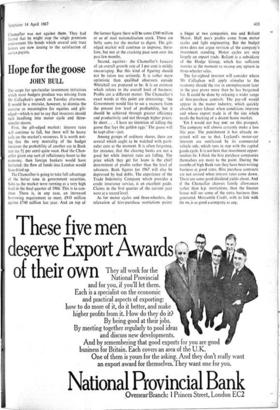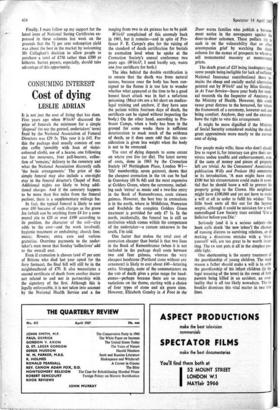Hope for the goose
JOHN BULL
The scope for spectacular investment initiatives which most budgets produce was missing from Mr Callaghan's speech on Tuesday afternoon. It would be a mistake, however, to dismiss the exercise as meaningless for equities and gilt- edged—which is not to say that investors should rush headlong into motor cycle and three- wheeler shares.
First, the gilt-edged market: interest rates will continue to fall, but there will be heavy calls on the market's resources. It is worth not- ing that the very neutrality of the budget increases the probability of another cut in Bank rate (to 51 per cent) quite soon. Had the Chan- cellor given any sort of reflationary boost to the economy, then foreign bankers would have hesitated; the flow of funds into London would have dried up.
The Chancellor is going to take full advantage of the better tone in government securities. Sales to the market were running at a very high level in the final quarter of 1966. This is to con- tinue. There is, in any case, an increased borrowing requirement to meet, £943 million against £740 million last year. And on top of the former figure there will be some £500 million or so of steel nationalisation stock. These are hefty sums for the market to digest. The gilt- edged market will continue to improve, there- fore, but not at the cracking pace seen over the past few months.
Second, equities : the Chancellor's forecast of an overall growth rate of 3 per cent is mildly encouraging. But this kind of figuring should not be taken too seriously. It is rather more optimistic than qualified observers outside Whitehall are prepared to be. It is an estimate which relates to the overall level of business. Profits are a different matter. The Chancellor's exact words at this point are interesting : 'the Government would like to see a recovery from the present low level of profitability, but it should be achieved through greater efficiency and productivity and not through higher prices. In short . . . I have no intention of killing the goose that lays the golden eggs.' The goose will be kept alive—just.
Among groups of ordinary shares, there are several which ought to be watched with parti- cular care at the moment. It is often forgotten, for instance, that the clearing banks are not a good bet while interest rates are falling. The price which they get for loans is the chief determinent of profits rather than the level of advances. Bank figures for 1967 will also be depressed by bad debts. The experience of the Trade Indemnity Company which provides a credit insurance service, is an excellent guide. Claims in the first quarter of the current year were at a record level.
As for motor cycles and three-wheelers, the relaxation of hire-purchase restrictions points
a finger at two companies, BSA and Reliant Motor. Half BSA'S profits come from motor cycles and light engineering. But the budget
news does not argue revision of the company's investment standing. Motor cycles are very largely an export trade. Reliant is a subsidiary of the Hodge Group, which has sufficient worries at the moment to swamp any upturn in three-wheeler sales.
The far-sighted investor will consider where Mr Callaghan will apply stimulus to the economy should the rise in unemployment later in the year prove more than he has bargained for. It could be done by relaxing a wider range of hire-purchase controls. The pay-off would appear in the motor industry, which quickly absorbs spare labour when conditions improve and whose export trade is of the size which needs the backing of a decent home market.
Yet I would not buy Dm on this prospect. The company will almost certainly make a loss
this year. The punishment it has already re- ceived will see to that. Leyland's motor-car interests are outclassed by its commercial lk
vehicle side, which runs in step with the capital goods cycle. It is not here that investment oppor- tunities lie. I think the hire purchase companies themselves are more to the point. During the months of high Bank rate they have been writing business at good rates. Hire purchase contracts are not revised when interest rates come down.
There are some good dividend yields about. And if the Chancellor chooses family allowances
rather than h.p. restrictions, then the finance house will see some of the extra business thus generated. Mercantile Credit, with its link with the AA, is as good a company as any. Finally, I must follow up my support for the latest issue of National Saving Certificates ex- pressed in these columns last week on the grounds that the 71 per cent redemption yield was about the best in the market by welcoming Mr Callaghan's decision to allow people to purchase a total of £750 rather than £500 as hitherto. Surtax payers, especially, should take advantage of this opportunity.































 Previous page
Previous page